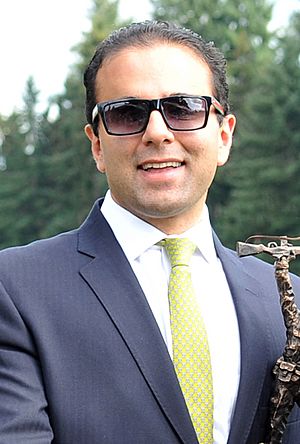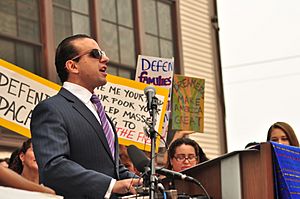Cyrus Habib facts for kids
Quick facts for kids
Cyrus Habib
|
|
|---|---|

Habib in 2017
|
|
| 16th Lieutenant Governor of Washington | |
| In office January 11, 2017 – January 13, 2021 |
|
| Governor | Jay Inslee |
| Preceded by | Brad Owen |
| Succeeded by | Denny Heck |
| Member of the Washington Senate from the 48th district |
|
| In office January 12, 2015 – January 4, 2017 |
|
| Preceded by | Rodney Tom |
| Succeeded by | Patty Kuderer |
| Member of the Washington House of Representatives from the 48th district |
|
| In office January 14, 2013 – January 12, 2015 |
|
| Preceded by | Deborah Eddy |
| Succeeded by | Joan McBride |
| Personal details | |
| Born |
Kamyar Cyrus Habib
August 22, 1981 Baltimore, Maryland, U.S. |
| Political party | Democratic |
| Parents |
|
| Education | Columbia University (BA) St John's College, Oxford (MLitt) Yale University (JD) |
Kamyar Cyrus Habib (born August 22, 1981) is an American Jesuit, a lawyer, and a former politician. He served as a state lawmaker in Washington from 2013 to 2017. After that, he became the 16th lieutenant governor of Washington, serving from 2017 to 2021.
He also acted as the state's governor for more than six months, mainly in 2019. This happened when Governor Jay Inslee was busy with his presidential campaign. Cyrus Habib is the first Iranian American to be elected to a statewide office in the United States.
Cyrus Habib has been completely blind since he was eight years old. He lost his eyesight due to cancer. In March 2020, he announced that he would leave politics at the end of his term. He decided to become a Jesuit priest in the Catholic Church.
Contents
Early Life and Education
Cyrus Habib was born in Baltimore, Maryland. His parents had moved to the U.S. from Iran. His mother is Superior Court Judge Susan Amini, and his father is an engineer and investor named Mo Habib.
Cyrus Habib survived cancer three times. He lost his eyesight and became fully blind when he was eight. Soon after, his family moved to Bellevue, Washington. He graduated from the Bellevue International School in 1999.
In 2003, he earned his bachelor's degree from Columbia University. He studied English, Comparative Literature, and Middle Eastern Studies. While in college, he had a collection of his photographs published. He also worked in Senator Hillary Clinton's office in New York City. He was named a Truman Scholar in 2002.
As a Rhodes Scholar, Habib earned a master's degree from St. John's College at the University of Oxford. He wrote his master's paper on authors Ralph Ellison and Salman Rushdie. After Oxford, he worked at Goldman Sachs in New York. He then studied law at Yale Law School and was named a Soros Fellow in 2007.
Habib received his law degree from Yale in 2009. He was an editor for the Yale Law Journal. He also worked to change U.S. currency so blind people could tell the different bills apart. His roommate at Yale was Ronan Farrow.
After graduating from Yale, Habib worked as a lawyer at Perkins Coie in Seattle. From 2009 to 2017, he helped new technology companies. He also led the firm's community projects.
Political Career
Serving in the State Legislature
In 2012, Cyrus Habib won a spot in the Washington House of Representatives. He defeated Hank Myers, a two-term Redmond City Councilman, getting 61% of the votes. He represented Washington's 48th Legislative District. This area includes cities like Bellevue, Kirkland, and Redmond. Habib raised the most money ever for a State House race in Washington. His fellow lawmakers chose him to be Vice Chair of the House Committee on Technology and Economic Development.
In 2014, Habib was elected to the Washington State Senate. He won with 65% of the vote. He took over from Senator Rodney Tom in the 48th Legislative District. Right after his election, his fellow Democrats chose him as Senate Democratic Whip. This put him in a top leadership role in the State Senate.
Becoming Lieutenant Governor
Before the 2016 legislative session, Habib announced he would run for Lieutenant Governor of Washington. This is an elected position separate from the governor. He challenged Brad Owen, who had held the office for twenty years. Owen later decided not to run again. Habib won the primary election against ten other candidates. He then defeated Republican Marty McClendon in November 2016. He raised $1.1 million for his campaign. President Barack Obama supported him and recorded phone calls to encourage people to vote for Habib.
Democratic Party Leadership Roles
While in office, Habib was also a member of the Democratic National Committee. He was also a co-chair of the Democratic Lt. Governor's Association. In 2016, the leaders of the Democratic National Committee chose Habib to be one of 25 members on the party's Platform Committee.
Habib was the western co-chair for Pete Buttigieg's presidential campaign in 2020.
Other Activities
During his time in state politics, Cyrus Habib had other roles too. Starting in 2013, he was a Professor at the Seattle University School of Law. He taught advanced courses there.
He was also a member of the Council on Foreign Relations. He served on the boards of several non-profit groups. These included the Seattle Symphony and Seattle Children's Hospital Foundation.
Religious Journey
On March 19, 2020, Habib announced he would not run for re-election. He decided to end his political career and become a Catholic priest. He had become Catholic while studying at Oxford. During his years in politics, he attended Mass at Seattle's St. James Cathedral.
He started thinking about becoming a priest in 2018. The Jesuits accepted him in 2019. His entry was delayed until his term as lieutenant governor ended. He wrote in America magazine that he felt a calling to help others. He wanted to serve those who are struggling and empower vulnerable people.
He entered the Jesuit training program in Culver City, California in the fall of 2020. On August 13, 2022, Habib made his vows of poverty, chastity, and obedience as a Jesuit.
Political Goals
As Lieutenant Governor, Cyrus Habib also led the Washington State Senate. His main goals were to make higher education more available to everyone. He also wanted to help job growth through international trade.
In Washington, the Lieutenant Governor often acts as a trade ambassador for the state. Habib led several trips to other countries. These trips aimed to help Washington companies sell their products abroad. They also encouraged foreign investment and cultural exchanges.
Helping with Education
In 2018, Habib disagreed with the idea that "college isn't for everyone." He called it an "elitist" view. He said that if more people don't get access to higher education, the gap between the rich and the poor will grow. In 2020, his office proposed new laws to remove barriers in Washington state's higher education system.
These laws required schools to share financial aid information with students and their families. They also created a single college application process for public four-year colleges. Another law stopped colleges from holding back student transcripts to collect debt.
Habib also created programs to help students who might not typically go to college. In 2018, he started Washington World Fellows. This program helps high school students become global leaders. It includes studying abroad and two years of college preparation. He also started Complete Washington. This program helps working adults get degrees for high-demand jobs.
In addition to his higher education programs, Habib created the Boundless Washington program. This program helps young people with disabilities. It offers outdoor adventures and leadership training. He climbed Mount Kilimanjaro in 2019 to help raise money for this program.
In 2019, Habib visited Dharamshala to meet with the Dalai Lama. They had a televised talk as part of Habib's Compassion Scholars program in Washington State. He started this program to teach ethical leadership in public high schools.
Boosting the Economy
Habib introduced several laws about technology and the economy. He wrote the Washington Jobs Act of 2014. This law allowed "investor crowdfunding" for the first time in Washington. This made it easier for new businesses to get money.
He also wrote a law that set rules for ride-sharing companies like Uber and Lyft. This law made sure drivers, passengers, and the public had enough insurance.
When federal funding for cancer research decreased, Habib introduced a law. This law aimed to create a special fund for cancer research in Washington State.
Open Government Initiatives
Habib introduced a law to let people comment on proposed laws using video from their smartphones. This was the first such bill in the country. This bill gained national attention. Habib said he was inspired by how John Oliver encouraged public involvement in net neutrality.
Social Justice Efforts
Habib was a main supporter of a law in the State Senate. This law guaranteed paid sick leave for almost all workers in Washington.
He also supported the Washington Voting Rights Act. This law was passed to stop cities and counties from using voting systems that unfairly affect certain racial groups.
As a Senator, Habib strongly pushed for laws to protect the rights of pregnant women at work. He saw this as a basic civil rights issue.
Habib's 2015 bill helped people leaving prison. It provided them with standard ID cards to help them re-enter society. This bill received wide support from both political parties.
He also fought to keep funding for civil legal aid in the state budget. He argued that cutting this funding would hurt families facing issues like foreclosure, domestic violence, and those needing help with veteran benefits.
Habib also sponsored the Truth in Evictions Reporting Act. This law helps tenants who were wrongly evicted to correct their rental history.
Environment and Transportation
Habib upset some Republicans when he proposed a law that said climate change is real. It also stated that human activity is a big reason for its speed.
As a member of the Senate Transportation Committee, Habib helped pass a major transportation investment plan. This plan completed the SR 520 bridge replacement. It also funded extensions for highways and added new lanes to I-405. It also allowed for new light rail and bus rapid transit in the Puget Sound area. He also wrote a law to give judges flexibility in reducing fines for not paying bridge tolls.
Awards and Recognition
Cyrus Habib is known as the first Iranian-American elected to a state office in the United States. He was also the first to serve in a statewide office.
He has been recognized as a Rhodes Scholar, a Truman Scholar, a Soros Fellow, and a Rodel Fellow at the Aspen Institute. The World Economic Forum named him a Young Global Leader.
In 2020, the Harvard Institute of Politics and the John F. Kennedy Library gave Habib the John F. Kennedy New Frontier Award for excellent public service.
In 2019, he received the Helen Keller Achievement Award from the American Foundation for the Blind.
In 2014, The Washington Post named Habib one of the "40 Under 40 Political Rising Stars." That year, Governing Magazine also named him one of "12 State Legislators to Watch" nationally.
In 2013, he was named a NewDEAL Leader.
See also
 | Roy Wilkins |
 | John Lewis |
 | Linda Carol Brown |


